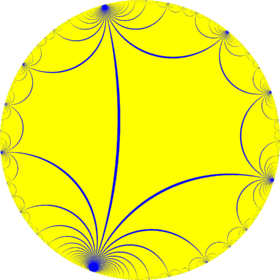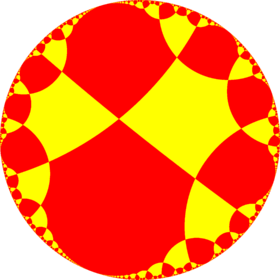Order-6 dodecahedral honeycomb
| Order-6 dodecahedral honeycomb | |
|---|---|
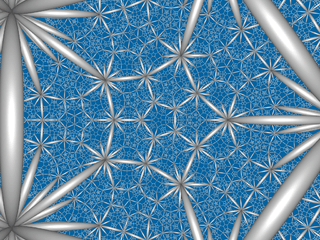 Perspective projection view within Poincaré disk model | |
| Type | Hyperbolic regular honeycomb Paracompact uniform honeycomb |
| Schläfli symbol | {5,3,6} {5,3[3]} |
| Coxeter diagram | |
| Cells | {5,3} |
| Faces | pentagon {5} |
| Edge figure | hexagon {6} |
| Vertex figure | {3,6}  |
| Dual | Order-5 hexagonal tiling honeycomb |
| Coxeter group | HV3, [5,3,6] HP3, [5,3[3]] |
| Properties | Regular, quasiregular |
The order-6 dodecahedral honeycomb is one of 11 paracompact regular honeycombs in hyperbolic 3-space. It is called paracompact because it has infinite vertex figures, with all vertices as ideal points at infinity. It has Schläfli symbol {5,3,6}, being composed of dodecahedral cells, each edge of the honeycomb is surrounded by six dodecahedra. Each vertex is ideal and surrounded by infinitely many dodecahedra with a vertex figure as a triangular tiling.
A geometric honeycomb is a space-filling of polyhedral or higher-dimensional cells, so that there are no gaps. It is an example of the more general mathematical tiling or tessellation in any number of dimensions.
Honeycombs are usually constructed in ordinary Euclidean ("flat") space, like the convex uniform honeycombs. They may also be constructed in non-Euclidean spaces, such as hyperbolic uniform honeycombs. Any finite uniform polytope can be projected to its circumsphere to form a uniform honeycomb in spherical space.
Symmetry
A half symmetry construction exists as ![]()
![]()
![]()
![]()
![]() with alternately colored dodecahedral cells.
with alternately colored dodecahedral cells.
Images
 The model is cell-centered in the within Poincaré disk model, with the viewpoint then placed at the origin. |
It is similar to the 2D hyperbolic infinite-order pentagonal tiling, {5,∞} with pentagonal faces. All vertices are on the ideal surface.
Related polytopes and honeycombs
It is one of 15 regular hyperbolic honeycombs in 3-space, 11 of which like this one are paracompact, with infinite cells or vertex figures.
| 11 paracompact regular honeycombs | |||||||||||
|---|---|---|---|---|---|---|---|---|---|---|---|
 {6,3,3} |
 {6,3,4} |
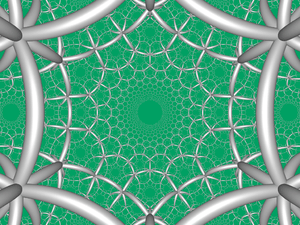 {6,3,5} |
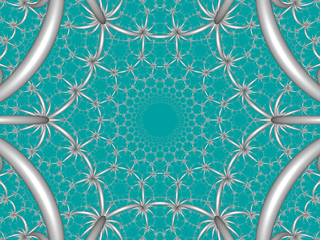 {6,3,6} |
 {4,4,3} |
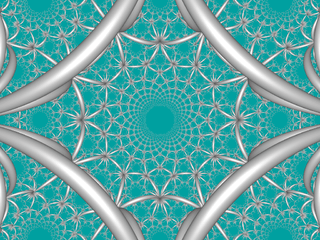 {4,4,4} | ||||||
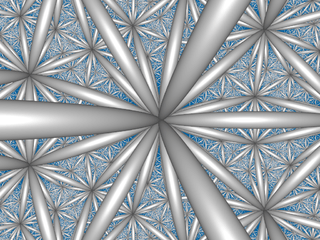 {3,3,6} |
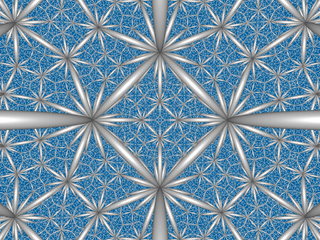 {4,3,6} |
 {5,3,6} |
 {3,6,3} |
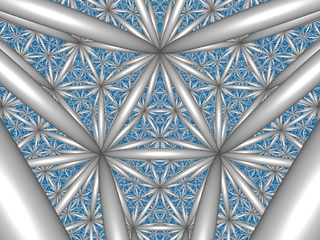 {3,4,4} | |||||||
There are 15 uniform honeycombs in the [5,3,6] Coxeter group family, including this regular form and its regular dual, order-5 hexagonal tiling honeycomb, {6,3,5}.
| {6,3,5} | r{6,3,5} | t{6,3,5} | rr{6,3,5} | t0,3{6,3,5} | tr{6,3,5} | t0,1,3{6,3,5} | t0,1,2,3{6,3,5} |
|---|---|---|---|---|---|---|---|
 |
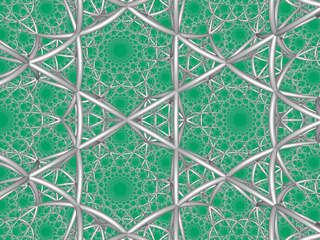 |
 |
 |
 |
 |
 |
 |
 |
 |
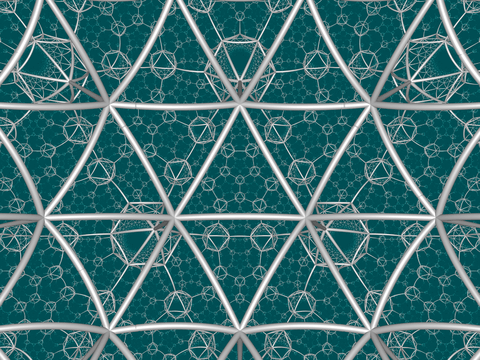 |
 |
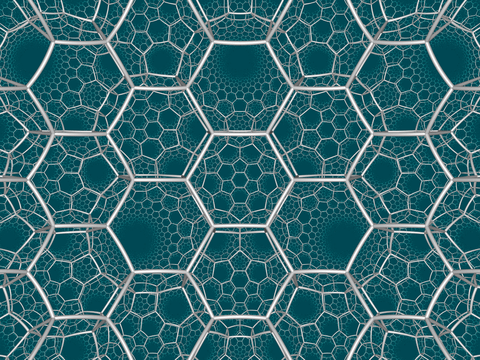 |
 |
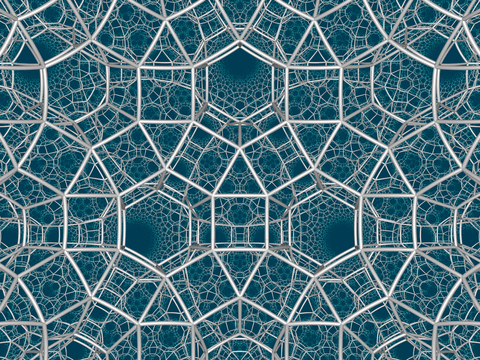 | |
| {5,3,6} | r{5,3,6} | t{5,3,6} | rr{5,3,6} | 2t{5,3,6} | tr{5,3,6} | t0,1,3{5,3,6} | t0,1,2,3{5,3,6} |
This honeycomb is a part of a sequence of polychora and honeycombs with triangular tiling vertex figures:
| Form | Paracompact | Noncompact | |||||
|---|---|---|---|---|---|---|---|
| Name | {3,3,6} | {4,3,6} | {5,3,6} | {6,3,6} | {7,3,6} | {8,3,6} | ... {∞,3,6} |
| Image |  |
 |
 |
 |
|||
| Cells | {3,3} |
{4,3} |
{5,3} |
{6,3} |
{7,3} |
{8,3} |
{∞,3} |
This honeycomb is a part of a sequence of polychora and honeycombs with dodecahedral cells:
| {5,3,p} polytopes | |||||||
|---|---|---|---|---|---|---|---|
| Space | S3 | H3 | |||||
| Form | Finite | Compact | Paracompact | Noncompact | |||
| Name | {5,3,3} | {5,3,4} | {5,3,5} | {5,3,6} | {5,3,7} | {5,3,8} | ... {5,3,∞} |
| Image |  |
 |
 |
 |
 | ||
| Vertex figure |
{3,3} |
{3,4} |
{3,5} |
{3,6} |
{3,7} |
{3,8} |
{3,∞} |
Rectified order-6 dodecahedral honeycomb
| Rectified order-6 dodecahedral honeycomb | |
|---|---|
| Type | Paracompact uniform honeycomb |
| Schläfli symbols | r{5,3,6} t1{5,3,6} |
| Coxeter diagrams | |
| Cells | r{5,3} {3,6} |
| Vertex figure |  Hexagonal prism { }×{6} |
| Coxeter groups | , [6,3,5] [5,3[3]] |
| Properties | Vertex-transitive, edge-transitive |
The rectified order-6 dodecahedral honeycomb, t1{5,3,6} has icosidodecahedron and triangular tiling cells connected in a hexagonal prism vertex figure.
-

Perspective projection view within Poincaré disk model
It is similar to the 2D hyperbolic infinite-order square tiling, r{5,∞} with pentagon and apeirogonal faces. All vertices are on the ideal surface.
| Space | H3 | ||||||
|---|---|---|---|---|---|---|---|
| Form | Paracompact | Noncompact | |||||
| Name | r{3,3,6} |
r{4,3,6} |
r{5,3,6} |
r{6,3,6} |
r{7,3,6} |
... r{∞,3,6} | |
| Image |  |
 |
 |
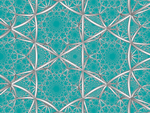 |
|||
| Cells {3,6} |
r{3,3} |
r{4,3} |
r{6,3} |
r{6,3} |
r{∞,3} |
r{∞,3} | |
Truncated order-6 dodecahedral honeycomb
| Truncated order-6 dodecahedral honeycomb | |
|---|---|
| Type | Paracompact uniform honeycomb |
| Schläfli symbols | t{5,3,6} t0,1{5,3,6} |
| Coxeter diagrams | |
| Cells | t{5,3} {3,6} |
| Vertex figure |  Hexagonal pyramid { }v{6} |
| Coxeter groups | , [6,3,5] [5,3[3]] |
| Properties | Vertex-transitive |
The truncated order-6 dodecahedral honeycomb, t0,1{5,3,6} has truncated dodecahedron and triangular tiling cells connected in a hexagonal pyramid vertex figure.

Cantellated order-6 dodecahedral honeycomb
| Cantellated order-6 dodecahedral honeycomb | |
|---|---|
| Type | Paracompact uniform honeycomb |
| Schläfli symbols | rr{5,3,6} t0,2{5,3,6} |
| Coxeter diagrams | |
| Cells | |
| Vertex figure |  |
| Coxeter groups | , [6,3,5] [5,3[3]] |
| Properties | Vertex-transitive |
The cantellated order-6 dodecahedral honeycomb, t0,2{5,3,6}.

Cantitruncated order-6 dodecahedral honeycomb
| Cantitruncated order-6 dodecahedral honeycomb | |
|---|---|
| Type | Paracompact uniform honeycomb |
| Schläfli symbols | tr{5,3,6} t0,1,2{5,3,6} |
| Coxeter diagrams | |
| Cells | |
| Vertex figure |  |
| Coxeter groups | , [6,3,5] [5,3[3]] |
| Properties | Vertex-transitive |
The cantitruncated order-6 dodecahedral honeycomb, t0,1,2{5,3,6} has a tetrahedral vertex figure.

Runcitruncated order-6 dodecahedral honeycomb
| Runcitruncated order-6 dodecahedral honeycomb | |
|---|---|
| Type | Paracompact uniform honeycomb |
| Schläfli symbols | t0,1,3{5,3,6} |
| Coxeter diagrams | |
| Cells | |
| Vertex figure |  |
| Coxeter groups | , [6,3,5] [5,3[3]] |
| Properties | Vertex-transitive |
The runcitruncated order-6 dodecahedral honeycomb, t0,1,2{5,3,6} has a trapezoidal pyramid vertex figure.

See also
References
- Coxeter, Regular Polytopes, 3rd. ed., Dover Publications, 1973. ISBN 0-486-61480-8. (Tables I and II: Regular polytopes and honeycombs, pp. 294–296)
- The Beauty of Geometry: Twelve Essays (1999), Dover Publications, LCCN 99-35678, ISBN 0-486-40919-8 (Chapter 10, Regular Honeycombs in Hyperbolic Space) Table III
- Jeffrey R. Weeks The Shape of Space, 2nd edition ISBN 0-8247-0709-5 (Chapter 16-17: Geometries on Three-manifolds I,II)
- Norman Johnson Uniform Polytopes, Manuscript
- N.W. Johnson: The Theory of Uniform Polytopes and Honeycombs, Ph.D. Dissertation, University of Toronto, 1966
- N.W. Johnson: Geometries and Transformations, (2015) Chapter 13: Hyperbolic Coxeter groups
